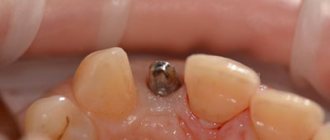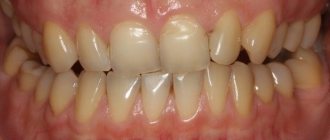Author of the article:
Soldatova Lyudmila Nikolaevna
Candidate of Medical Sciences, Professor of the Department of Clinical Dentistry of the St. Petersburg Medical and Social Institute, Chief Physician of the Alfa-Dent Dental Clinic, St. Petersburg
The human body is a kind of unified mechanism, the elements of which are closely interconnected. The health of all organs, including teeth, depends on the quality of products, the balance of the diet and, accordingly, the amount of nutrients received.
Everyone knows that calcium is necessary to strengthen teeth. But few people know about which products this element is best absorbed from, what other vitamins and minerals they need, what strengthening products to use and what nutrition can support the health and good condition of teeth. Let's figure out what vitamins adults and children need to strengthen tooth enamel.
Alphabet Classic
Regular plaque removal at the dentist's office is important. Pathological deposits are easier and faster to remove in a soft state, without waiting for them to harden. This will prevent disease of the gum tissue and crowns.
A complex of three types of tablets: calcium, antioxidants, iron has a positive effect on the oral cavity. The tablets are taken daily, one from each group. The drug has a positive effect not only on the oral cavity, but on the entire body. Vitamin balance must be maintained at all times. The Alphabet includes 13 vitamins and 10 minerals.
Clinical researches
Clinical studies have proven that regular use of professional toothpaste ASEPTA REMINERALIZATION improved the condition of the enamel by 64% and reduced tooth sensitivity by 66% after just 4 weeks.
Sources:
- Report on the determination/confirmation of the preventive properties of personal oral hygiene products “ASEPTA PLUS” Remineralization doctor-researcher A.A. Leontyev, head Department of Preventive Dentistry, Doctor of Medical Sciences, Professor S.B. Ulitovsky First St. Petersburg State Medical University named after. acad. I.P. Pavlova, Department of Preventive Dentistry
- Clinical experience in using the Asepta series of products Fuchs Elena Ivanovna Assistant of the Department of Therapeutic and Pediatric Dentistry State Budgetary Educational Institution of Higher Professional Education Ryazan State Medical University named after Academician I.P. Pavlova of the Ministry of Health and Social Development of the Russian Federation (GBOU VPO RyazSMU Ministry of Health and Social Development of Russia)
- The use of new anti-inflammatory drugs in the complex of therapeutic and preventive measures for periodontal diseases (E.D. Kuchumova, A.A. Leontyev, O.V. Kalinina, L.Yu. Orekhova, S.B. Ulitovsky) E.D. Kuchumova, Ph.D., Associate Professor, A.A. Leontyev, dentist, O.V. Kalinina, dentist, L.Yu. Orekhova, Doctor of Medical Sciences, Professor, Head of Department, S.B. Ulitovsky, Doctor of Medical Sciences, Prof. Department of Therapeutic Dentistry of St. Petersburg State Medical University named after. acad. I.P. Pavlova
Vitamin and mineral "Asepta"
This complex is needed to balance the amount of nutrients. After all, nutrition does not always fully provide the body with the necessary substances. Today you can buy ready-made complexes in pharmacies. The drug "Asepta" strengthens the gums and chewing organs. It consists of the following components: A, C, B3, B9, B6 and D3. An additional substance is green tea extract. It prevents inflammation, has an antiseptic effect, and prevents the appearance of caries and bleeding gums.
Usage rate
Throughout a person’s life, the required amount of calcium changes:
- Infants under 6 months need 200 mg daily.
- Children from 7 months to one year need 260 mg per day.
- Between the ages of one and three years, a child needs 700 mg.
- Children from 4 to 8 years old need 1000 mg of the macronutrient daily.
- A maximum dose of 1300 mg/day is needed for ages 9-18 years.
- Women aged 19 to 50 years need 1000 mg of calcium per day.
- Men aged 19 to 70 years need 1000 mg per day.
- Women aged 51 years and older need 1200 mg daily.
- Men 71 years of age and older require 1,200 mg of calcium per day.
The greatest amount of calcium is needed by a person in childhood and adolescence, when permanent teeth appear. This is due to the fact that the macroelement accumulates in the teeth only during their formation. And the further condition of the teeth depends on how much this supply is replenished. Unfortunately, it will not be possible to influence the health of molars by consuming calcium-containing foods.
Vitrum Calcium
Vitamins for teeth for adults and children are an important component of good health. The child must first receive D and A in order for his chewing organs to fully develop. With a deficiency of these substances, the units become distorted and stomatitis appears. If the baby cannot consume enough dairy products, eggs, fish liver, bell peppers, greens, carrots, butter, cabbage, the baby is prescribed vitamin and mineral complexes. When choosing a drug for teenagers, pay attention to the proportion of calcium, phosphorus, magnesium, zinc, iron, and copper. "Vitrum Calcium" is approved for use from 12 years of age. A special feature of the complex is strengthening the structure of hard tissues, preventing the crumbling of crowns and the development of caries.
Children's vitamins for dental health
Most often, the question of vitamins arises among parents in connection with the late appearance of teeth. In fact, there are no vitamins and minerals for teeth growth. In the vast majority of cases, the age at which the first tooth appears is influenced by genetics.
In general, the composition of vitamins for children differs from that for adults, so it is better to purchase special complexes rather than divide your tablet in half, into three parts, and so on. Choose a form that will be pleasant for your child - effervescent vitamins, gummy bears and syrups, then your child will be happy to take care of his dental health!
DentoVitus
With its help, you can strengthen the chewing organs and maintain their attractive appearance. It is rich in vitamins K, A, E, B6, C, D3. The microelements included in its composition help tissues regenerate and ensure the synthesis of their matrix. The drug is available in the form of effervescent tablets that dissolve in water. Components: A, E, B6, K, D3, C, 11 minerals, including fluorine.
- Nutrients are absorbed by the body quickly;
- enamel and dentin are well strengthened;
- The walls of the capillaries become stronger;
- blood circulation improves;
- the looseness of gum tissue decreases;
- cuts and wounds in the oral cavity heal quickly;
- mucous membranes are restored in case of mechanical damage;
Vitamin A
The importance of vitamin A is extremely difficult to overestimate. It is necessary for the health of gums and mucous membranes; maintains their smoothness and resistance to disease. Also, this vitamin is needed for the formation of bone tissue and the proper functioning of metabolic processes. It maintains the strength of the enamel and protects it from destruction.
The main signs and consequences of vitamin A deficiency:
- the enamel becomes rough and loses its shine;
- the gums and mucous membranes of the mouth become inflamed, redness and swelling appear, and stomatitis may occur;
- wounds and ulcers in the mouth do not heal for a long time;
- Tooth mobility develops and they can become loose;
- the enamel becomes fragile and prone to destruction.
Foods rich in vitamin A:
- carrots and other vegetables and fruits that are orange in color;
- green vegetables;
- spinach;
- milk, butter, cheese;
- eggs;
- caviar, fish, etc.
A sufficient amount of vitamin A helps maintain not only health, but also white teeth.
Duovit
This medication belongs to the group of multivitamins that stimulates metabolism. The drug compensates for the deficiency of minerals and vitamins. The composition of the red dragee includes:
- retinol, colecalciferol;
- ascorbic acid, nicotinamide;
- calcium pantothenate, tocopherol;
- pyridoxine, riboflavin;
- thiamine, folic acid and cyanocobalamin;
Blue jelly beans include magnesium, phosphorus, manganese, calcium, iron, copper, zinc and molybdenum. If the crowns are not durable and naturally white, the dentist recommends fluoridation of the teeth. Using this effective method, the enamel is strengthened and the risk of caries is minimized. When there is enough fluoride in the body, dentin is not destroyed, crowns do not become thinner, and periodontal diseases do not develop.
What are teeth made of?
Teeth consist of more than just the visible (crown) part. The important parts of the tooth are the root and neck, hidden in the gum and jawbone. The hollow cavity inside the tooth, the pulp chamber, includes nerve endings and blood vessels - they are the ones that nourish the tooth from the inside. The vessels and nerves are covered with dentin, a thick layer of dental material. Dentin, in turn, is covered with a thin layer of a super-strong substance - enamel. Surprisingly, enamel is the strongest element in the entire human body.
Have you ever seen the surface of a tooth under high magnification? Using a microscope, you can see a crystal lattice resembling a honeycomb on its surface. In fact, this mass makes up 95% of the tooth structure, and 5% is water in a bound and free state.
Calcium D3 Nycomed
These vitamins for strengthening gums and teeth belong to combined preparations. The drug is prescribed to regulate the metabolism of phosphorus and calcium. It is well absorbed and tolerated, since D3 is chemically bound to calcium. Dosage: 1 to 2 times a day with food, sucking or chewing. After 15 days of use, the structure of enamel and bone tissue improves significantly.
What vitamins should I take for dental health?
The table of vitamins contains substances that are synthesized in our body in sufficient quantities, and there are those in which a person is deficient. Especially at certain stages of life. For example, women over 50 need additional vitamin E capsules, and in winter almost everyone requires increased doses of vitamin D.
Almost the entire spectrum of vitamins is necessary for dental health, however, some of them play a leading role in calcium metabolism. And calcium, as we have already found out, is the basis of dentin and enamel.
Vitamin D3
The main driver of calcium metabolism is vitamin D.
By the name vitamin D we mean a complex of active substances. Cholecalciferol (vitamin D3) is formed in the body under the influence of sunlight, and ergocalciferol (vitamin D2) can only be obtained from food. Many people are interested in which one is better to buy – water-soluble D2 or fat-soluble D3? In fact, both of them equally contribute to the absorption of calcium by the body, so you can choose either one and take it according to the instructions.
Many doctors recommend getting tested for vitamin D before you start taking it in tablets. This makes sense, since fat-soluble vitamins can accumulate in the body and cause various diseases.
The minimum daily dose for adults and children is 400 units.
Vitamin C, ascorbic acid
Ascorbic acid takes part in the synthesis of collagen, which is part of dentin. Collagen provides tissue strength. Without it, teeth would be fragile and brittle.
If we talk about which vitamins you can drink in large doses, then ascorbic acid is one of them. The minimum daily dose of vitamin C is 60 mg, however, sometimes it is advisable to increase it to 1000 mg. Ascorbic acid does not accumulate in the body, but is immediately excreted in the urine.
Vitamin K
The trivial name vitamin K combines vitamin K1 (phylloquinone) and K2 (menaquinone). The first of them is found in some plant foods, and the second is synthesized in our intestines with the participation of fats. In pharmacies you can usually buy only phylloquinone, while scientists have found that it is less active than its counterpart.
The daily dose of vitamin K2 is approximately 80 mg. It simply needs to be taken along with calcium for the normal condition of the enamel. Menaquinone is needed to form the correct spatial lattice of an organic molecule containing calcium.
Vitamin B complex
Vitamins B1, B6, B12 and others, although not directly involved in the synthesis of dentin and enamel, help maintain normal metabolism in general.
Daily doses of B vitamins in tablets are:
- Vitamin B1 – 1.5 mg.
- Vitamin B2 – 1.7 mg.
- Vitamin B3 – 20 mg.
- Vitamin B5 – 10 mg.
- Vitamin B6 – 2 mg.
- Vitamin B12 – 6 mcg.
Osteocea
Hygienic cleaning of the oral cavity performed by a professional dentist is the key to good dental health. This procedure minimizes the risks of caries, gingivitis, and periodontitis. In addition, one should not allow a deficiency of vitamins and microelements in the body. Customers today trust Vitabiotics and its products. The main thing is that Osteokea has no side effects. The drug is taken twice a day, one tablet. The product quickly replenishes the lack of nutrients in the body, strengthens bone tissue, and improves the condition of the oral mucosa. The drug saturates the body with calcium, zinc, magnesium, and vitamin D.
Microelements necessary for bones and teeth
The use of calcium preparations in dentistry is mandatory not only for prevention, but also for dental treatment. In order for this element to better penetrate bone tissue in medications and dietary supplements, it is combined with other minerals, vitamins and even Omega-3 fatty acids. Pharmacy drugs are sold under a variety of names, but to choose the best one, you need to carefully read the composition in the annotation.
Calcium
If we consider medications, then calcium and calcium are different. For example, in the instructions for using calcium gluconate injections there is not a word about teeth, which means this drug is not suitable for us. The same can be said about calcium chloride or calcium chloride, which is used in medicine for completely different purposes. Neither calcium oxide nor calcium hydroxide are also suitable for strengthening tooth enamel, since they are practically not absorbed by the body.
Modern pharmacology offers us essentially five types of compounds - gluconate, carbonate, citrate, malate and chelate molecules. The price for them is completely different - from mere pennies for calcium carbonate to impressive sums for glycinates and bisglycinates (chelates).
- Calcium gluconate is the most affordable drug, known since Soviet times. One can say something cheap and cheerful about him. To get the maximum effect, the tablet must be chewed and washed down with plenty of water.
- Calcium carbonate is a good form to absorb. Rapidly breaks down in the body, releasing free calcium.
- Calcium citrate - until recently was considered the most active form. Also releases free calcium in the lumen of the small intestine.
- Calcium malate is similar to the previous one, only in combination not with citric acid, but with malic acid.
- Calcium glycinate and bisglycinate are chelated forms or organic calcium. Even though it is a synthetic molecule, it has the best properties of natural organic calcium compounds. Firstly, it immediately penetrates cell membranes as an organic molecule (free calcium needs to undergo a number of modifications for this). Secondly, it does not affect the absorption and activity of iron ions, zinc and some medications that were previously not recommended to be taken with calcium.
For maximum effect, all calcium supplements should be taken on an empty stomach one hour before meals. This should be done in the evening, since the peak metabolism of this mineral occurs around 18:00. If the daily dose is more than 500 mg, then it is advisable to divide it into 2-3 doses - anyway, more than 500 mg at a time will not be absorbed.
Phosphorus
In order for calcium from the blood to penetrate into the teeth and bones, and to fix it there, phosphorus is needed. In good vitamins for men and women, the dose of this mineral should be about half the calcium content. In general, it is recommended to take up to 1000 mg of phosphorus per day, and approximately half of this figure should come from food.
Without phosphorus, calcium is absorbed much worse, and most importantly, it begins to be deposited in tissues other than bones and teeth, which leads to the development of various diseases.
Magnesium
The relationship between calcium and magnesium in the body is very complex. Magnesium is directly involved in the mineralization of bones and teeth, being a kind of cement that holds calcium together. At the same time, he is its antagonist - that is, he performs absolutely opposite tasks.
In order to have strong teeth, it is necessary that at least 400 mg of magnesium enter the body daily. It is better to take it separately from calcium supplements, since their competition manifests itself at the absorption stage, so one thing will be absorbed per unit of carrier molecule - either calcium or magnesium.
Fluorine and boron
Fluoride is an essential mineral in the fight against tooth decay. In teeth it is found in the form of a sparingly soluble complex that is very resistant to acids. It allows the enamel to maintain its protective properties even in an acidic environment, when carious bacteria are most active.
Boron also promotes the absorption of calcium and prevents its loss by dental and bone tissue.
For fluoride and boron, optimal daily doses have not yet been established, which exist for most vitamins and microelements, however, when buying a multivitamin complex for dental health, you need to make sure that they are included in it.
Zinc, copper, manganese
Zinc is part of the dentin of teeth. It is involved in the formation of coarse-fiber bone tissue. Its optimal daily dose is 15 mg.
Copper is very important for gum health. In combination with calcium, it is even used to treat inflammatory periodontal diseases in the acute phase. The maximum daily dose is 2 mg.
Manganese plays an important role in the synthesis of chondroitin and is found in tooth dentin. To maintain healthy teeth and bones, it is enough to take at least 2 mg of manganese per day.
General information about periodontal disease
Due to certain reasons, you may encounter a disease that affects the periodontal tissues. Destructive processes occur in the gums, causing burning and atrophy.
A feature of the disease is that it is an asymptomatic and painless process, and as a result, a visit to the doctor is postponed. As a result of periodontal disease, teeth become loose and their sensitivity increases.
What does periodontal disease look like?
- Exposure of the tooth neck and roots;
- Pale gum shade;
- Changes in enamel color;
- Itching in the gums;
- Visual increase in the gap between teeth;
- Sclerosis of bone tissue (this is especially visible in the picture).
The disease can affect only a few teeth or affect an entire row (jaw). Stages of periodontal disease:
- Initial, which is characterized by minor changes that are noticeable only to a specialist.
- The first is a slight receding of the gums, a reaction to hot and cold occurs.
- The second is a slight exposure of the neck of the teeth, the appearance of an interdental gap, and in some places cement forms instead of enamel.
- The third is characterized by receding gums by 50%, eating food causes discomfort, and teeth begin to loosen. With periodontal disease, pain occurs when biting into food.
- The fourth is the advanced stage, which causes problems with eating, talking, receding gums occurs by 65%.
Diagnosis of periodontal disease - visual examination of the dentist, x-ray (orthopanorama).
Will calcium supplements help strengthen teeth?
When it comes to adults, dentists answer this question in the negative. After all, calcium accumulates in the tooth tissue during its formation. And that’s when it is needed to strengthen teeth. When this process is over and the tooth has erupted, neither calcium nor other minerals enter the dental tissue from the blood.
In other words, you can take calcium supplements or eat cottage cheese and cheese every day, but you won’t be able to strengthen your teeth this way - they were fully formed in your childhood.
Nevertheless, dentists recommend eating a little cheese after a “sweet” meal. And although calcium from it will not get into the tooth enamel, cheese promotes the appearance of saliva, which cleanses the oral cavity. In addition, the calcium contained in cheese neutralizes the acidity of saliva, which prevents the destruction of enamel.
As for calcium supplements, they should be taken after consultation with a doctor, who can determine the lack of this element in the body.
Vitamin deficiency and its causes
Vitamin deficiency is a disease caused by a lack of vitamins that a person receives from food. Vitamin deficiency is most often due to the fact that in winter a person does not have the opportunity to eat as varied and nutritious as in the summer. During storage, fruits and vegetables lose some of their beneficial properties, the body’s reserves are depleted, and vitamin deficiency makes itself felt. In addition, the cause of vitamin deficiency is often diseases of the internal organs. The body’s ability to synthesize and absorb vitamins from incoming foods is directly related to the state of the digestive tract and the composition of the intestinal microflora. Enzymes that digest certain foods can be formed in the body depending on lifestyle, diet, and even factors such as heredity. With aggressive treatment with antibiotics, beneficial microorganisms are killed. To restore them and normalize intestinal functions, an additional course of treatment is required.
Does calcium help maintain teeth in old age?
Yes, in old age, taking calcium supplements helps preserve your teeth. A study was conducted that confirmed this fact. So, two groups of people after 65 years of age took three years in a row: the first took calcium supplements and vitamin D, the second took a placebo (“dummies”). After this, the subjects were observed for another two years. It turned out that in the first group people lost teeth less often than in the second. But this is not due to the fact that calcium makes teeth stronger. Here, the main role was played by strengthening the jaws, and consequently, better fixation of the tooth in the jaw.
Symptoms of vitamin deficiency and diagnosis
Vitamin deficiency is usually diagnosed by external signs, which can be difficult at an early stage. The most complete picture can be drawn from a blood and urine test, determining the saturation of the cell plasma with certain types of useful substances. When a lack of vitamins occurs, irritability and decreased performance are more likely to occur; patients note the presence of chronic fatigue syndrome and decreased concentration. Hair becomes brittle, nail plates peel, peeling and rashes appear on the skin. As the deficiency increases, the signs of malaise intensify.











